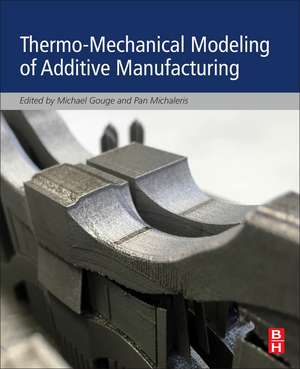Thermo-Mechanical Modeling of Additive Manufacturing
Editat de Michael Gouge, Pan Michalerisen Limba Engleză Paperback – 7 aug 2017
The book serves as an essential reference for engineers and technicians in both industry and academia, performing both research and full-scale production. Additive manufacturing processes are revolutionizing production throughout industry. These technologies enable the cost-effective manufacture of small lot parts, rapid repair of damaged components and construction of previously impossible-to-produce geometries. However, the large thermal gradients inherent in these processes incur large residual stresses and mechanical distortion, which can push the finished component out of engineering tolerance. Costly trial-and-error methods are commonly used for failure mitigation. Finite element modeling provides a compelling alternative, allowing for the prediction of residual stresses and distortion, and thus a tool to investigate methods of failure mitigation prior to building.
- Provides understanding of important components in the finite element modeling of additive manufacturing processes necessary to obtain accurate results
- Offers a deeper understanding of how the thermal gradients inherent in additive manufacturing induce distortion and residual stresses, and how to mitigate these undesirable phenomena
- Includes a set of strategies for the modeler to improve computational efficiency when simulating various additive manufacturing processes
- Serves as an essential reference for engineers and technicians in both industry and academia
Preț: 596.99 lei
Preț vechi: 787.72 lei
-24% Nou
Puncte Express: 895
Preț estimativ în valută:
114.25€ • 124.06$ • 95.97£
114.25€ • 124.06$ • 95.97£
Carte tipărită la comandă
Livrare economică 15-29 aprilie
Preluare comenzi: 021 569.72.76
Specificații
ISBN-13: 9780128118207
ISBN-10: 0128118202
Pagini: 294
Dimensiuni: 191 x 235 x 18 mm
Editura: ELSEVIER SCIENCE
ISBN-10: 0128118202
Pagini: 294
Dimensiuni: 191 x 235 x 18 mm
Editura: ELSEVIER SCIENCE
Cuprins
Part I The fundamentals of additive manufacturing modeling
1. An introduction to additive manufacturing processes and their modeling challenges
Michael Fielding Gouge, Pan Michaleris
2. The Finite Element Method for the Thermo-Mechanical Modeling of Additive Manufacturing Processes
Erik Denlinger, Jeff Irwin, Michael Fielding Gouge
Part II Thermomechanical modeling of Direct Energy Deposition processes
3. Convection Boundary Losses During Laser Cladding
Michael Fielding Gouge
4. Conduction Losses due to Part Fixturing During Laser Cladding
Michael Fielding Gouge
5. Microstructure and Material Properties of AM Builds
Allison Michelle Beese
6. Understanding microstructure evolution during additive manufacturing of metallic alloys using phase-field modeling
Yanzhou Ji, Lei Chen, Long-Qing Chen
7. Modeling Microstructure and Material Properties of AM Processes Using the FE Method
Jeff Irwin
8. Thermo-mechanical Modeling of Thin Wall Builds Using the Direct Process
Jarred Heigel
9. Residual Stress and Distortion Modeling of Electron Beam Direct Manufacturing Ti-6Al-4V
Erik Denlinger
10. Thermo-mechanical Modeling of Large Electron Beam Builds
Erik Denlinger
11. Mitigation of Distortion in Large Additive Manufacturing Parts
Erik Denlinger
Part III Thermomechanical modeling of powder bed processes
12. Development and Numerical Verification of an Adaptive Mesh Coarsening Strategy for Simulating Laser Powder Bed Fusion Processes
Erik Denlinge
13. Experimental Validation for In Situ Distortion Modeling of the Laser Powder Bed Fusion Process
Erik Denlinger
14. Scan Pattern Effects in Laser Powder Bed Fusion Processes: In Situ Measurements and Experimental Validation
Alexander Dunbar
15. Experimental Validation of Multi-scale Thermo-mechanical Modeling of Laser Powder Bed Fusion Processe
Jeff Irwin, Michael Fielding Gouge
1. An introduction to additive manufacturing processes and their modeling challenges
Michael Fielding Gouge, Pan Michaleris
2. The Finite Element Method for the Thermo-Mechanical Modeling of Additive Manufacturing Processes
Erik Denlinger, Jeff Irwin, Michael Fielding Gouge
Part II Thermomechanical modeling of Direct Energy Deposition processes
3. Convection Boundary Losses During Laser Cladding
Michael Fielding Gouge
4. Conduction Losses due to Part Fixturing During Laser Cladding
Michael Fielding Gouge
5. Microstructure and Material Properties of AM Builds
Allison Michelle Beese
6. Understanding microstructure evolution during additive manufacturing of metallic alloys using phase-field modeling
Yanzhou Ji, Lei Chen, Long-Qing Chen
7. Modeling Microstructure and Material Properties of AM Processes Using the FE Method
Jeff Irwin
8. Thermo-mechanical Modeling of Thin Wall Builds Using the Direct Process
Jarred Heigel
9. Residual Stress and Distortion Modeling of Electron Beam Direct Manufacturing Ti-6Al-4V
Erik Denlinger
10. Thermo-mechanical Modeling of Large Electron Beam Builds
Erik Denlinger
11. Mitigation of Distortion in Large Additive Manufacturing Parts
Erik Denlinger
Part III Thermomechanical modeling of powder bed processes
12. Development and Numerical Verification of an Adaptive Mesh Coarsening Strategy for Simulating Laser Powder Bed Fusion Processes
Erik Denlinge
13. Experimental Validation for In Situ Distortion Modeling of the Laser Powder Bed Fusion Process
Erik Denlinger
14. Scan Pattern Effects in Laser Powder Bed Fusion Processes: In Situ Measurements and Experimental Validation
Alexander Dunbar
15. Experimental Validation of Multi-scale Thermo-mechanical Modeling of Laser Powder Bed Fusion Processe
Jeff Irwin, Michael Fielding Gouge
